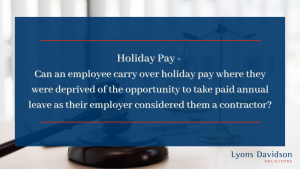
Holiday Pay: Can an Employee Carry over holiday pay where they were deprived of the opportunity to take paid annual leave as their employer considered them a contractor?
This was the issue considered by the Court of Appeal in the recently decided Smith v Pimlico Plumbers [2022] EWCA Civ 70.
In this case Mr Smith was initially engaged by Pimlico as what was purported to be an independent contractor. Mr Smith was subsequently successful in establishing in the Tribunal that he had in fact been a worker and was, accordingly, entitled to workers rights including a right to paid annual leave.
Mr Smith sought to claim that he was entitled to holiday pay carried over from previous years. It was accepted that Mr Smith had not had the opportunity to take paid leave, but had utilised unpaid annual leave during prior years. Mr Smith sought to rely upon the decision in King v The Sash Window Workshop Ltd C-214/16 which had established that where a worker was prevented from taking annual leave due to refusal to recognise worker status, they were entitled to claim carry over of the same. The facts of this case differed materially from Mr Smith’s circumstances in that Mr King had never exercised any right to take holiday (inclusive of unpaid leave) during his engagement as a result of his mistaken belief that he was a contractor.
The Court of Appeal has decided that whether or not the holiday was in fact taken should not be the determining factor in whether or not carry over will apply.
In delivering the substantive judgment Lady Justice Simler confirmed that the only conduct which will extinguish the right to paid leave is in fact being provided the opportunity to take the paid leave and declining to do so. Unless the employer can establish “it specifically and transparently gave the worker the opportunity to take paid annual leave, encouraged the worker to take paid annual leave and informed the worker that the right would be lost at the end of the leave year” then that right will continue to carry over and accumulate until termination of the contact. At this point the worker is entitled to a payment in respect of the accrued untaken leave. This judgment will be of particular interest to employers and workers who find themselves in dispute regarding worker status and would seem to increase the risk of compensation to employers who have previously sought to treat potential workers as contractors.
In additional non-binding, comments, Lady Justice Simler set out her view that the decision in Bear Scotland Ltd and Others v Mr David Fulton and Others: UKEATS/0047/13/BI should not be followed. This particularly pertains to the findings in that case in relation to any series of deductions being effectively broken after any break of three months without deductions. Rather Lady Justice Simler noted it is her view that “It is a question of fact and degree, based on the evidence, whether deductions are sufficiently similar or related over time to constitute a “series”.



